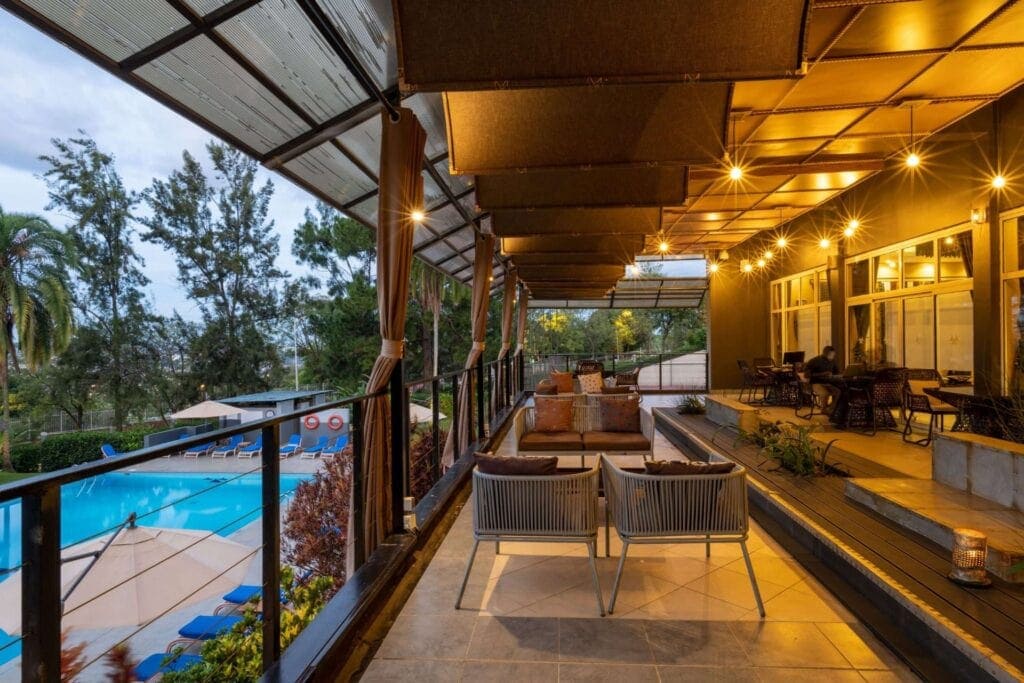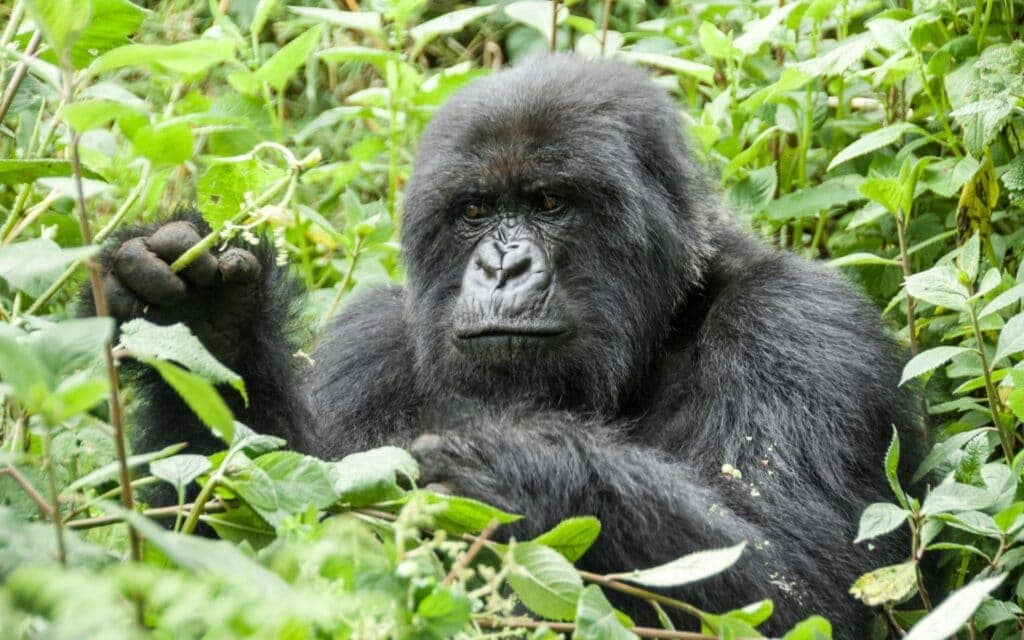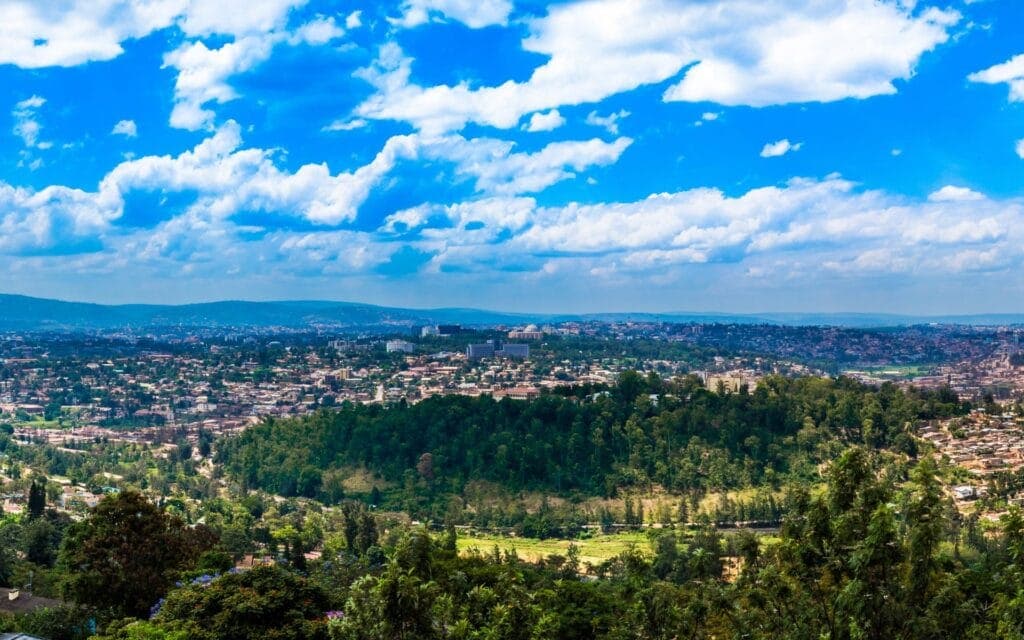So, you want to venture into the heart of Rwanda’s lush forests to encounter the majestic mountain gorillas? Planning a comprehensive gorilla trekking safari to this East African country, complemented by visits to various landmarks and accommodations, involves several key stages.
Our guide offers expert tips on where to go, what you need to know about costs, where to stay, top attractions, what to expect weatherwise, and how your trip positively impacts the ‘gorillas in the mist trekking legacy of this wildlife destination renowned for the conservation and protection of its primate species.
Let’s break down this exciting journey in detail to ensure you get the most out of your gorilla trekking safari, ensuring it is as awe-inspiring and seamless as the landscapes you’ll explore.
Arrival in Kigali
Your adventure begins in Kigali, the vibrant capital of Rwanda. In terms of size and the transformative nature of its economy and urban development, Kigali can be compared to Pittsburgh, Pennsylvania. Both cities have a population of approximately 300,000 to 350,000 residents within their city limits.
Like Pittsburgh, which transitioned from a heavy industrial base to a center for technology, education, and healthcare, Kigali has undergone significant transformation over recent decades. It has evolved from a city with historical challenges to a modern capital noted for its cleanliness, safety, and investment in information and communication technologies.
Cultural Hub
The city hosts the Kigali Genocide Memorial, an important site dedicated to the memory of the victims of the 1994 genocide against the Tutsi. This memorial provides profound insights into Rwanda’s history and promotes peace and reconciliation.
Eco-Conscious Capital
Kigali was one of the first cities in Africa to ban plastic bags, setting a precedent for waste management and sustainability efforts continent-wide.
Hotel Rwanda Inspiration
Kigali is home to the historic Hôtel des Mille Collines, which famously served as the inspiration for the Oscar-nominated film documenting the genocide against the Tutsi in Rwanda in the spring of 1994.

Gorilla Trekking in Volcanoes National Park
Make your way to the breathtaking Volcanoes National Park, home to the majestic mountain gorillas. By choosing the Virunga Lodge as your base, you position yourself perfectly for an early morning departure on your gorilla trekking adventure. This profound journey into the wilderness allows you to spend an hour closely observing a habituated gorilla family in their lush natural habitat. Accompanied by expert trackers, you’ll gain unparalleled insights into these incredible primates’ daily lives and behaviours.
Diverse Volcanic Landscape
Part of the Virunga Mountains comprises six extinct and three active volcanoes. This unique geological formation spans across three countries: Rwanda, Uganda, and the Democratic Republic of Congo.
Conservation Legacy
Established in 1925 as Africa’s first national park to protect mountain gorillas, it gained fame through the conservation efforts of Dian Fossey, significantly raising global awareness for gorilla protection.

Chimpanzee Encounter in Nyungwe Forest
For those seeking a broader primate experience, you can also see golden monkeys right within Volcanoes National Park, or consider combining this with chimpanzee trekking in Nyungwe Forest National Park. Trekking in Nyungwe can be challenging but rewarding, with a rich array of flora and fauna and the chance to spend an hour with a chimpanzee family.
Biodiversity Hotspot
Nyungwe, one of Africa’s oldest rainforests, is a treasure trove of biodiversity with over 1,000 plants, 85 mammals, and 300 bird species. It is a vital sanctuary for endangered chimpanzees and hosts possibly Africa’s largest troops of L’Hoest’s monkeys and Rwenzori colobus.
Canopy Walkway
One of Nyungwe’s most thrilling attractions is the Canopy Walkway. Suspended 60 metres above the forest floor, this 200-metre long bridge offers visitors a unique perspective of the forest’s uppermost layers. This is one of the first canopy walkways in Africa, providing a stunning and exhilarating experience of walking above a vast and ancient forest.
Cruise on Lake Kivu
Following your trek, continue your exploration of Rwanda by heading to the tranquil waters of Lake Kivu. Here, you’ll embark on the luxury vessel Mantis Kivu Queen uBuranga, a distinctive floating hotel that offers a 2-night itinerary sailing from Gisenyi to Nyamasheke.
As you cruise, immerse yourself in the breathtaking scenery that surrounds one of Africa’s Great Lakes. This journey provides a peaceful transition from your trek and allows you to enjoy world-class onboard amenities and engage in activities like kayaking and cultural village visits.
Cultural and Economic Hub
The shores of Lake Kivu are dotted with several resort towns, such as Gisenyi, Kibuye, and Cyangugu, which are essential for both local culture and the economy. These towns are popular with tourists for their beautiful beaches, relaxing atmosphere, and the opportunity to engage in water sports and other recreational activities.
Scenic Beauty
The lake offers stunning views of the surrounding hills and the distant Virunga volcanoes, providing a picturesque setting perfect for relaxation and photography.
Gorilla Trekking Safari Costs and Permits
The cost of a Rwanda Gorilla Trekking safari typically includes accommodations, permits for gorilla and chimpanzee trekking, meals, and transportation. Gorilla permits are $1,500 per person, crucial for conservation efforts and supporting local communities. Generally, prices start from about $1,500 per person per day, covering accommodation, permits, guides, transportation, and most meals. Luxury packages can cost significantly more, offering premium lodging and additional amenities.
Conservation and Community
A significant portion of your gorilla trekking fees contributes to wildlife conservation and supports local communities, ensuring sustainable tourism practices are upheld. Here are two pertinent facts to consider as you plan your gorilla trekking safari in Rwanda:
Successful Conservation Efforts
Thanks to concerted conservation efforts, including strict protection policies and community engagement, the population of mountain gorillas has increased from about 620 in 1989 to over 1,000 today, making them the only great ape species experiencing a population increase.
Community Benefits
About 10% of the revenue from gorilla trekking permits is allocated directly to local communities. This funding supports infrastructure projects such as schools, clinics, and clean water initiatives, helping to improve the quality of life for those living near gorilla habitats.
Gorilla trekking in Rwanda is organised in small, intimate groups:
- Standard Trekking Groups: Each group consists of up to eight trekkers and is guided by experienced trackers and guides. These groups visit one of several habituated gorilla families.
- Exclusive Private Treks: For a higher fee, private treks offer a more personalised experience with your own guide and trackers.
A gorilla trek in Rwanda is more than just a safari; it’s an immersive journey into the world of one of our closest animal relatives, set against the backdrop of Rwanda’s stunning landscapes. Your trek will be exhilarating and profoundly enriching through thoughtful preparation and respectful engagement, contributing positively to conservation and community upliftment.

Additional Details for Planning
Rwanda Weather and Climate: When Should You Go?
Rwanda’s climate is generally mild and temperate. The best times for trekking are during the dry seasons, from June to September and December to February. This Safari Planning Calendar can help you decide.
Packing List
You will need to be fully equipped to embrace the elements and the extraordinary wildlife in Rwanda. Here’s a list of essential items to pack for optimal comfort, safety, and enjoyment during your journey – but rest assured, the guide of your chosen lodge will give you a detailed briefing beforehand on how to prepare, what to expect, and how to behave while in these extraordinary creatures’ presence.
- Waterproof hiking boots
- Rain gear
- Long-sleeved shirts and trousers
- Gardening gloves
- Hat, sunglasses, sunscreen, and insect repellent
- Camera (no flash)
- Binoculars
- Water and snacks
Experience the magic of Rwanda with Discover Africa. Our expertly crafted gorilla treks offer luxury, culture, and unforgettable encounters with mountain gorillas. Start planning your memorable adventure today!
Author: Alice Lombard
Published:
Last Update:
Part of the East Africa Safari Collection